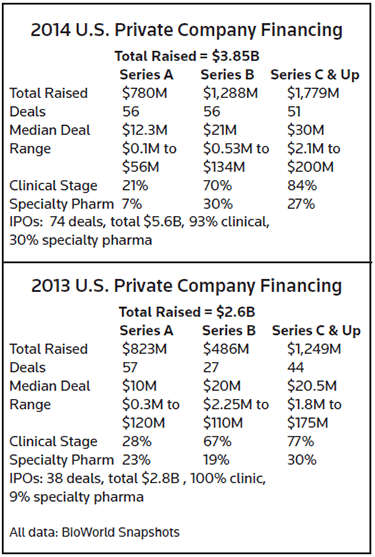
VCs give the gift of capital; 2014 was a banner year for start-ups
Print
09 January 2015
Brian Orelli, BioWorld
Merry Christmas, happy Hanukkah, joyous Kwanzaa. Whatever you celebrated, the venture capitalists gave the biopharma industry a mighty large gift in 2014. Investments in private drug companies tracked by BioWorld Snapshots rounded out the year at $3.85 billion, up substantially from the $2.6 billion in 2013 in the U.S.
Pretty much across the board, 2014 looked better than 2013. Even later-stage investments, which I lamented were lagging last quarter, managed to post a substantial gain for the year, with 51 series C or later investments totaling $1.78 billion in 2014 compared to 44 investments totaling $1.25 billion in the previous year.
It looks like many of the companies that were started at the beginning of the current financing turnaround were ready to go back to the well. Firms looking for series B financing saw the biggest jump year over year with both the number of investments and the total amount invested more than doubling year over year. All told the category brought in $1.29 billion from 56 deals.
Companies appear to be getting into the clinic with fewer rounds of investments. Seventy percent of companies seeking series B financing in 2014 were already in the clinic compared to 67 percent in 2013. The margin for series C investments was even larger at 84 percent vs. 77 percent for 2014 and 2013, respectively.
The only obvious blemish when comparing the two years was the decrease in capital invested in series A rounds in 2014, but the devil is in the details.
While series A investments dipped from $823 million in 2013 to $780 in 2014, the number of companies started in both years were fairly similar. And the percent of start-ups that were considered specialty pharma, defined as a company in-licensing drugs or using a platform to reformulate drugs, dropped to just 7 percent. Both are good signs for the health of the start-up community.
The difference in total investments for series A companies can be accounted for by the lack of an outsized first-round investment this year. Last year, Juno Therapeutics Inc. brought a whopper of a series A investment, totally $120 million.
Venture capitalists don't typically invest that much money in early stage companies. Unless you've got a hot technology like Juno, then, apparently, they flood you with cash. Juno also topped 2014's list of the largest series A investments with its $56 million series A continuation deal.
Ironically – or perhaps not – Juno rounded out the year as the largest IPO of 2014 in the U.S., bringing in an additional $305 million for the Seattle-based cellular immunotherapy company.
Juno was just one of an outstanding 77 drug companies that went public this year. The capital was flowing faster than champagne on New Year's with a total of $5.7 billion invested in newly public companies. By comparison, in 2013, we saw 38 companies make it out the door bringing in $2.9 billion.
The pace of IPOs slowed down in the fourth quarter with just 16 companies going public on the U.S. exchanges compared to 20 in the third quarter. But the last quarter of the year was higher than the 12 IPOs we saw in the second quarter, so it doesn't seem to be too much to worry about at this point, especially considering the recent holidays. Who wants to go on a road show in December?
My New Year's resolution for the venture capital community: More of the same. Please.

All Portfolio
MEDIA CENTER
-
The RMI group has completed sertain projects
The RMI Group has exited from the capital of portfolio companies:
Marinus Pharmaceuticals, Inc.,
Syndax Pharmaceuticals, Inc.,
Atea Pharmaceuticals, Inc.

